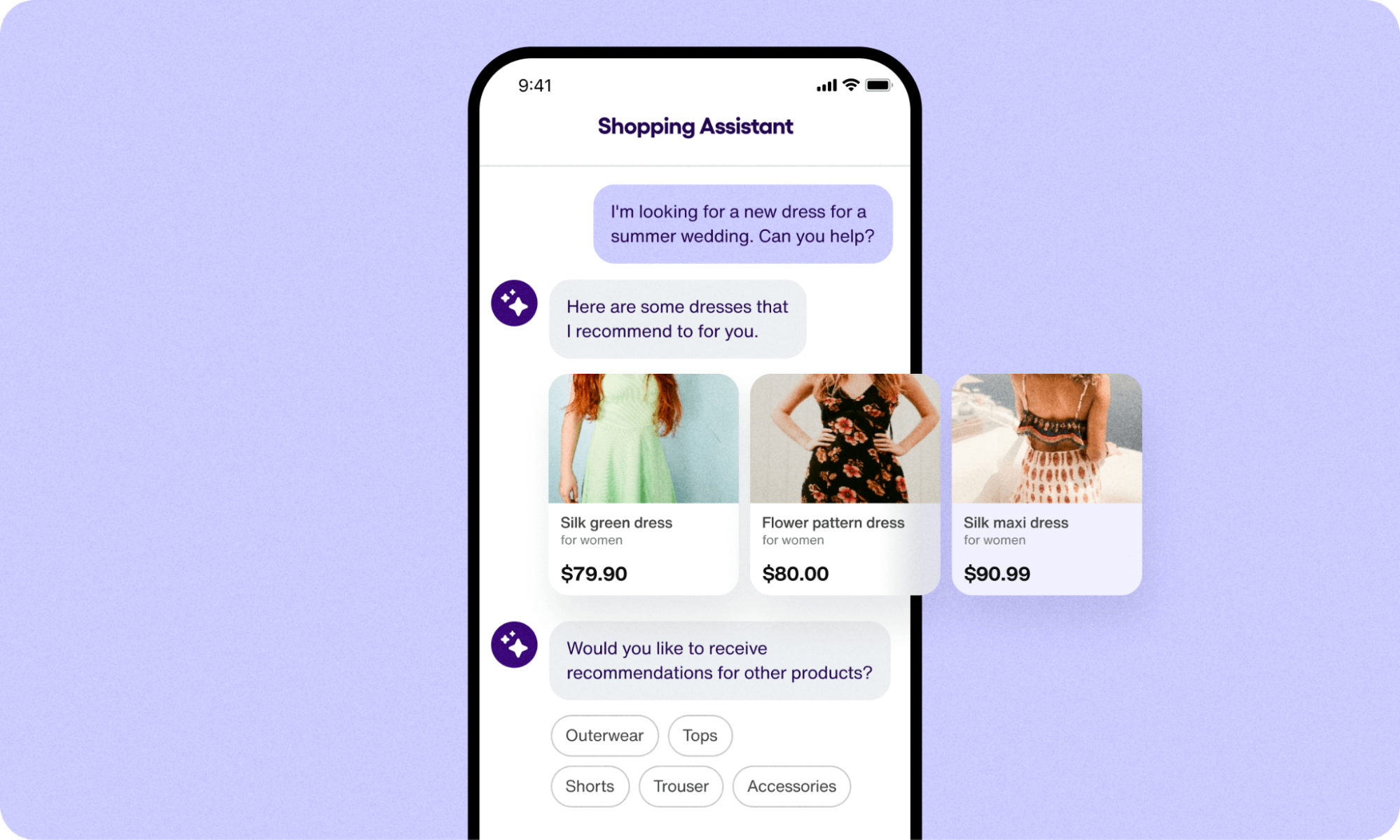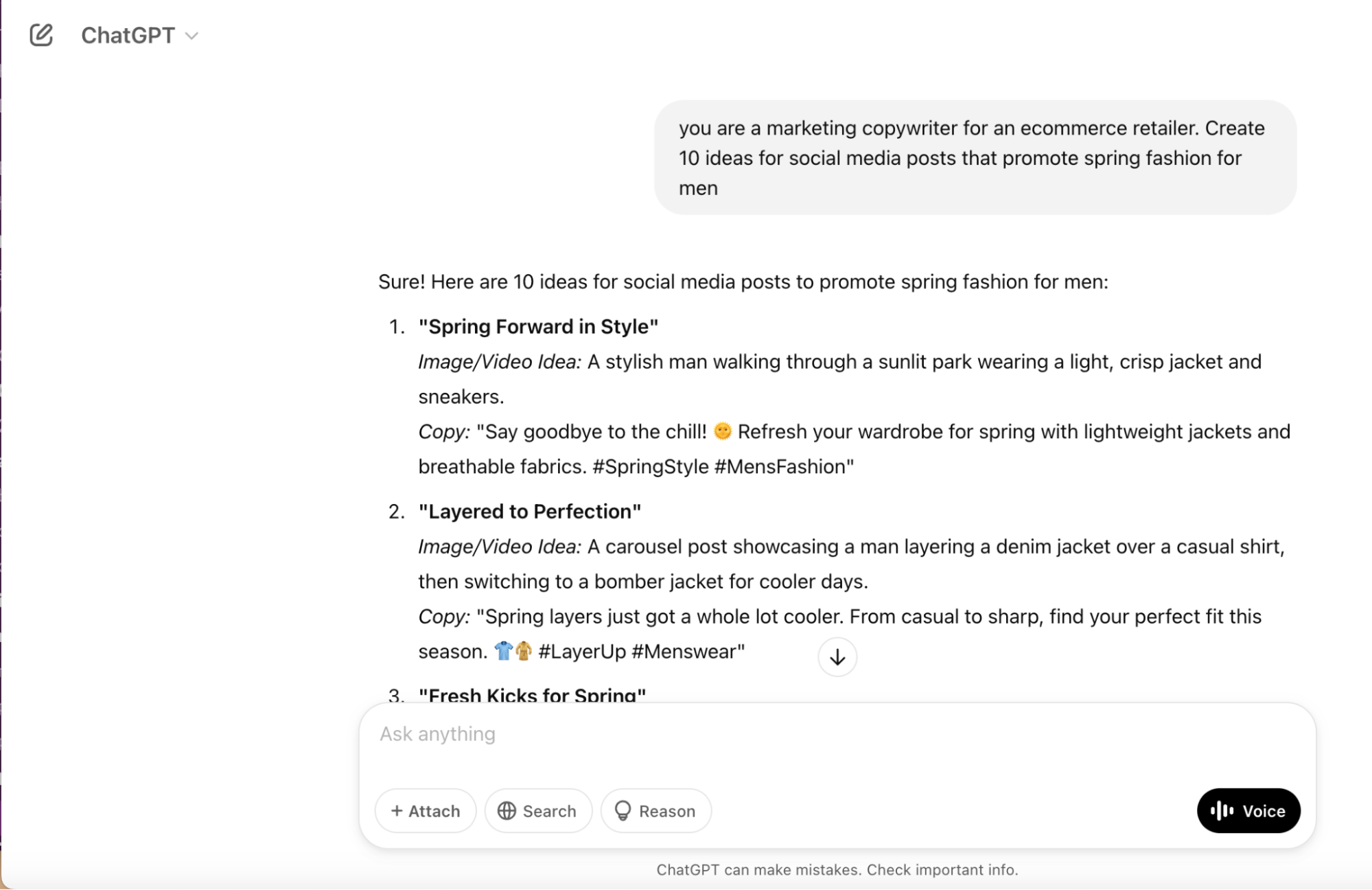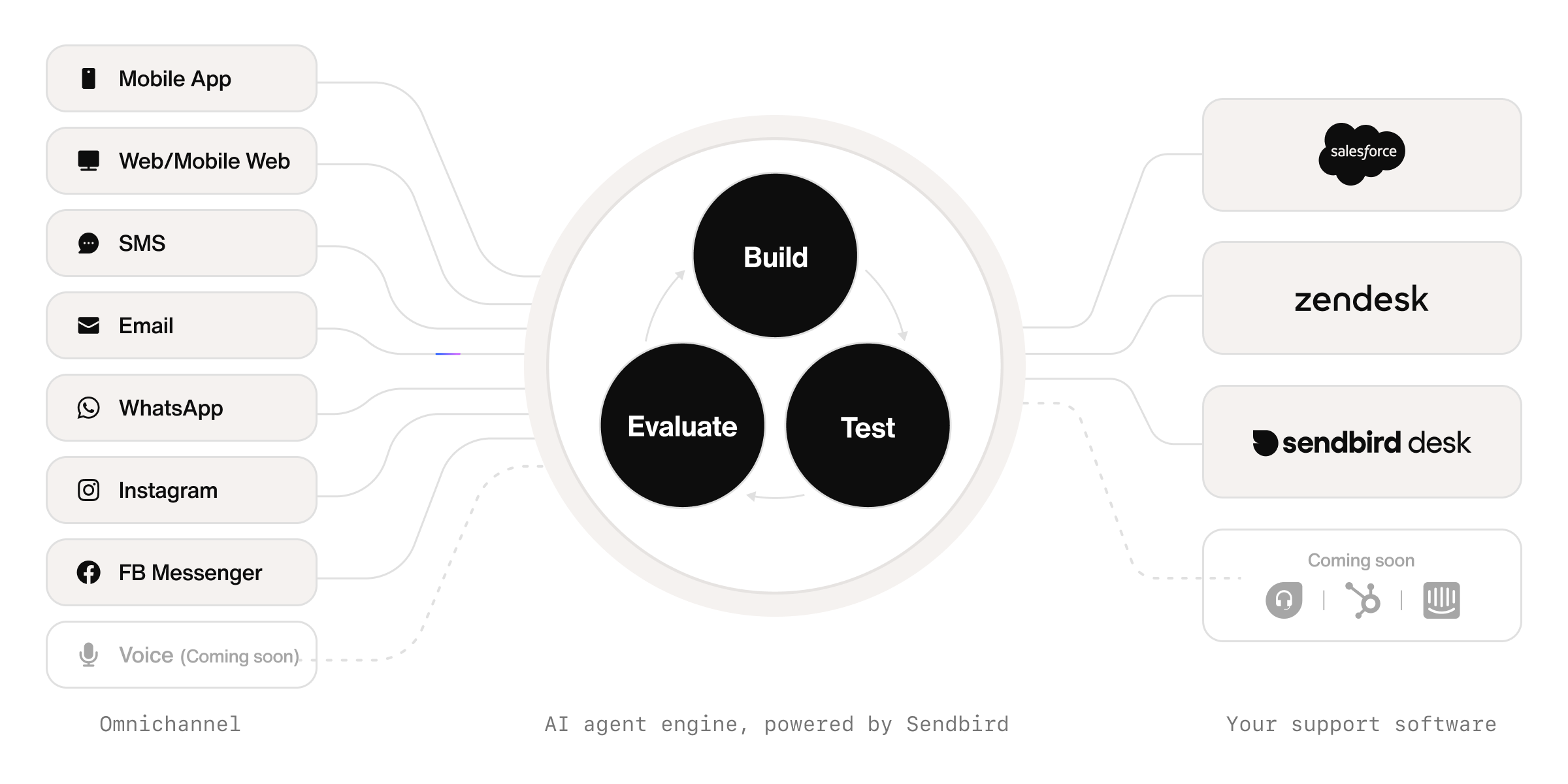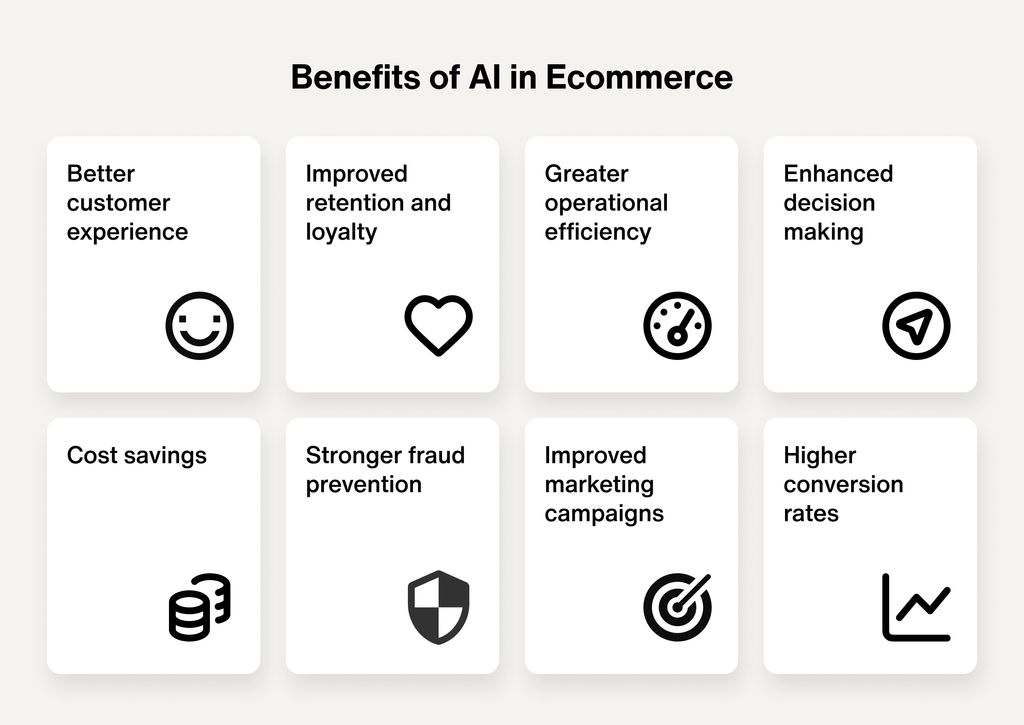AI in ecommerce: Everything you need to know (Use cases + best practices)

Imagine a world where your customer experience becomes more personalized and seamless every day while operations become more data-driven, streamlined, and profitable. This is the power of AI in ecommerce.
From predictive recommendation systems to generative AI chatbots, AI is fast becoming the new engine for online retail success. In 2024, adoption of Gen AI jumped from 55% to 75% among business leaders, signaling its growing importance in competitive operations. The next frontier is AI agents—autonomous entities that use real-time data and execute tasks from start to finish.
An AI concierge allows retailers to scale hyper-personalized experiences and automate complex processes with contextual understanding, setting a new standard for operational efficiency, business intelligence, and customer experience (CX).
This article explores 15 key AI use cases in ecommerce, highlighting the latest AI tools that B2C and B2B retailers need to stay competitive and win customers for life.

8 major support hassles solved with AI agents
Understanding AI in ecommerce
With over 33% of the world’s population now shopping online, there’s increasing demand for flexible, convenient, and seamless shopping on a global scale. Faced with rising customer expectations, costs, and operational complexity, retailers must deliver exceptional experiences to cut through the noise and win loyal customers. This is where AI shines.
AI allows online retailers to analyze and leverage vast amounts of data in real-time to improve operational efficiency, increase sales, make data-driven decisions, and gain a deeper understanding of customers—all while delivering a more personalized, seamless shopping experience across channels.
It's a win-win for shoppers and retailers, so it’s no surprise that over 70% of ecommerce businesses are now using AI in some form. These technologies are complementary when integrated effectively, and fall into three main buckets:
Core types of AI in ecommerce
Predictive AI: Analyzes historical data like customer behavior, preferences, and purchase history using machine learning (ML) algorithms to identify patterns and make predictions.
Use cases: Demand forecasting, inventory optimization, dynamic pricing, audience segmentation, personalized product recommendations
Generative AI: Interprets customer queries and automatically creates a contextually relevant output in any language using natural language processing (NLP) and ML.
Use cases: AI customer support chatbots, automated content generation website content, marketing campaigns, and automated product descriptions
Agentic AI: AI agents are proactive systems that perceive their environment and leverage real-time data via APIs and tools to solve problems on their own. They expand AI's scope of information and functionality to use both historical and real-time data in dynamic ways.
Use cases: All the above. AI agents are complementary technology that enables a new generation of context-driven personalization, process automation, AI for customer service, and actionable business intelligence—known as agentic commerce.
By integrating these intelligent technologies into existing functions, retailers can create more contextually appropriate and relevant buying experiences, automate complex tasks, and optimize operations to drive growth at scale.
Learn more: What is agentic AI?
15 key AI use cases in ecommerce
How do you use AI in ecommerce? Research shows that AI customer care can boost customer satisfaction, revenue, and cost savings by up to 25%, but knowing where to start can be challenging because the technology is evolving rapidly.
Here are the most impactful AI use cases in ecommerce:
1. Hyper-personalized product recommendations
Personalization is a key driver of customer engagement and loyalty, as a full 81% of shoppers favor brands that tailor their experience. AI-driven recommendation systems use machine learning (ML) and predictive analytics to track behavior, analyze preferences, and tailor shopping experiences to shoppers. Meanwhile, generative chatbots use NLP to recommend products to shoppers based on the business data they’ve been pre-trained on.
AI customer service agents go a step further, tailoring the individual CX based on past and present data to deliver hyper-personalized recommendations. For example, a website shopping assistant agent can recommend products based on purchase history and preference, but also the current context of the conversation, user behavior, and even prior interactions stored in memory—providing a more accurate, relevant recommendation that increases the likelihood of conversion.

By upgrading chatbots to AI agents for retail, businesses can deliver the most contextually appropriate and relevant buying experiences based on up-to-the-second data to improves engagement, sales, and customer satisfaction.
Key AI tech: AI-driven recommendation engines like Qubit, Klevu, or Amazon Recommendations AI; AI agent builders like Sendbird
Learn more: AI agents vs chatbots: Key differences explained
2. Proactively curb cart abandonment
Cart abandonment is the scourge of online retailers, but AI support agents for ecommerce can help. Combining context awareness with goal-oriented behavior, AI agents can proactively trigger personalized offers at checkout to reduce cart abandonment.
For example, an AI agent can perceive when a shopper has stalled on the checkout page, then proactively trigger a coupon for free shipping or a discount in the split second before they bounce to help to close the sale.

What if the customer does bounce? Omnichannel AI agents can follow up with customers across preferred channels like chat, email, or social media, nudging them with relevant cart reminders and marketing promotions to help salvage the sale.
Key AI tech: AI agent platform
3. Automated customer service with AI agents
Ecommerce AI agents are widely adopted, able to handle around 70% of customer interactions on their own. That said, AI concierges are the next generation of shopping assistants, offering a more seamless support experience without the usual friction.
Like chatbots, AI agents use NLP to understand and respond to customer inquiries in a conversational way with accurate, relevant responses. Available 24/7 on websites and support channels, agents can provide immediate support, answer FAQs about shipping and returns, recommend products, even execute tasks like transaction processing.
Unlike chatbots, AI agents can remember past interactions with customers. This enables them to hold a single continuous conversation with customers that spans channels, eliminating the friction of playing catch-up with returning customers. By maintaining context between interactions, AI customer care agents enable a more convenient, efficient service experience that elevates customer satisfaction and loyalty— while freeing human agents for more complex tasks.

Key AI tech: AI agent builders
Related reading: 9 ways to use AI in customer service
4. Dynamic pricing optimization
AI helps retailers to maximize profits by optimizing prices to current market conditions. Using ML algorithms, AI-driven pricing tools analyze internal and external factors like product availability, demand history, production cost, and average online price to dynamically set prices for optimal profitability.
For example, Amazon uses AI-powered dynamic pricing tools to optimize prices as often as every 10 minutes, helping the retail giant to increase profits by 143% annually on average. In effect, if demand for a certain product spikes, AI bumps up the listed price automatically. Or when a competitor slashes prices, AI drops the price on your site to match.
With an AI-driven pricing optimization strategy, retailers can improve inventory management, optimize personalization, and maximize revenue in the face of ever-changing market conditions.
Key AI tech: Dynamic pricing tools like Price2Spy, Repricer, or Pricefy
5. Conversational commerce with AI voice-assisted shopping
Voice-assisted shopping and search are gaining traction among shoppers, with 22% of people saying they prefer voice-enabled AI assistants like Alexa or Google Assistant to typing. By integrating NLP and voice recognition technology into websites and support channels, retailers can offer a more convenient experience that drives sales among the millions of consumers who already use voice-enabled AI to shop and discover new products.
AI agents are perfect for voice-assisted shopping and search. They can guide customers through the shopping process from start to finish with a live conversation, seamlessly shifting from comparing prices to processing transactions to handling returns or exchanges. And since AI agents for ecommerce are omnichannel, if the customer switches channels, all previous shopping activity is preserved—helping to increase sales, operational efficiency, and CX in ways gen AI chatbots can’t.

Key AI tech: Voice recognition AI, natural language processing, AI agents or chatbots
6. Smarter search capabilities
AI enhances the search capabilities of websites and mobile apps, making it faster and easier for shoppers to find the products they want. Retailers can integrate the following AI technologies to supercharge their product discovery process:
Natural language processing (NLP): Enables site search engines to understand the meaning and intent behind a user’s search query in any language to deliver the most relevant results—even if the search query contains variations like typos, synonyms, or slang.
AI-assisted visual search: Enable customers to search for products by uploading an image instead of typing. Employs AI algorithms and image recognition tech to suggest items similar to what’s pictured, improving discovery among customers that don’t know the product name.
Context-based search: Uses AI algorithms to scan external data like trending products, seasonality, and day of the week to make more relevant search results. Can also auto-fill search phrases and suggest related products to increase the likelihood of a purchase.

Key AI tech: NLP, context-based search, AI-driven image recognition
7. Improved customer segmentation and marketing
Audience segmentation is essential to effective personalized marketing, and AI in ecommerce can help. Using ML, AI-driven tools for customer segmentation analyze user data and identify patterns across datasets, then create accurate customer segments based on shared characteristics—even discovering entirely new segments and characteristics that may have been overlooked.
This enables retailers to tailor marketing strategies and target campaigns with surgical precision, ultimately reaching, engaging, and converting audiences more effectively. In fact, well-segmented marketing campaigns have been shown to drive a potential 760% increase in revenue.
Key AI tech: AI-driven customer segmentation tools like Salesforce Marketing Cloud, Klaviyo, or BlastPoint.
8. Intuitive upselling and cross-selling
AI can anticipate which products will appeal to customers and recommend these items in opportune moments to drive upsells and cross-sells. Combining ML algorithms with predictive analytics, AI-driven recommendation systems analyze past purchases, preferences, and browsing behavior to tailor experiences across websites, chatbots/shopping assistants, and mobile apps to the tastes of individual customers.
Dynamic website content is an example of this AI support use case in ecommerce, such as the “You might also like” sections on websites or the “Frequently bought together” product bundles on checkout pages. In fact, 63% of consumers say AI-powered product recommendations are highly influential on their purchases.

Key AI tech: AI-driven recommendation engines like Amazon Recommendations AI, Qubit, or Klevu.
9. Auto-generated content
With generative AI for ecommerce, retailers can automatically create highly tailored content that drives greater engagement and sales—but at a fraction of the time and cost. Based on the customer profile and current behavior, gen AI tools can create a variety of content tailored to specific experiences and audience segments, such as:
Product descriptions
Marketing content
Dynamic website content
Personalized product recommendations

Combining predictive analytics with NLP, these tools quickly create copy that’s compelling, unique, and contextually relevant. This improves the consistency of the customer experience and enhance personalization, helping to drive sales and customer satisfaction.
Key AI tech: Generative AI tools like ChatGPT, Copy.ai, or Jasper
10. Fraud detection and prevention
Protecting retailers against fraudsters in real-time is another key AI use case in ecommerce. AI-powered fraud detection tools use advanced ML algorithms to analyze transactions, behavioral data, IP addresses, credit card information, and more to detect complex patterns and irregularities that suggest fraudulent activity.
Going a step further, AI agents can take action to halt fraudulent transactions in the moment. For example, a vertical AI agent for fraud prevention on a website can require additional verification from suspicious buyers before authorizing a purchase, while flagging the high-risk transaction for the fraud team.

This proactive, real-time approach to fraud prevention helps to reduce financial losses for retailers and maintain shopper confidence by not disrupting the everyday shopping experience.
Key AI tech: Fraud detection AI tools like Kount, Featurespace, or Darktrace; AI agents specialized for fraud detection
11. Fake review detection
Customer reviews are key to building trust and driving sales, as 93% of online shoppers read reviews before making a purchase. However, research shows that around 30% of online reviews are fake, which can seriously erode trust and conversions if left up.
Using NLP and machine learning, AI can quickly analyze text patterns, writing styles, and formatting to identify and flag suspicious reviews. Amazon, for example, uses advanced language models and big data analytics to evaluate seller reviews, considering data points like previous reports of abuse, review histories, and even ad investments (which can incentivize fake reviews).
Key AI tech: NLP and ML; AI tools like FakeSpot

Automate customer service with AI agents
12. Supply chain optimization
Beyond enhancing CX, AI enables retailers to increase operational efficiency and reduce costs by automating repetitive tasks and decision-making processes in the supply chain. Some of these key AI in ecommerce use cases include:
Smart logistics systems: Use AI agents in Internet of Things (IoT) devices like sensors, radio-frequency identification (RFID) tags, and smart shelves to monitor real-time inventory levels—reducing manual effort, driving efficiency, predicting demand, and optimizing production costs.
Route optimization: AI optimization algorithms consider factors like transportation networks, traffic, and weather in real-time to determine the most efficient delivery routes and reduce transportation costs. Alibaba, for example, reduced costly delivery errors by 40% using AI.
Order tracking: AI enables continuous real-time order tracking, providing visibility into the location and status of inventory shipments and customer orders along the last mile, helping to improve both customer satisfaction and warehouse operations.
Key AI tech: Optimization algorithms, AI agents for real-time data, robotic process automation (RPA) for warehouse operations
13. Sales and demand forecasting
AI significantly improves the accuracy of demand forecasting as a part of supply chain optimization. By analyzing sales data, demographics, customer behavior, plus external factors like weather and customer reviews, AI algorithms can predict demand with surgical precision then adjust inventory levels accordingly to maximize profitability.
By factoring in lead times plus variable demand from seasonality and on-off events, AI minimizes the risk of stockouts while preventing overstocking. AI agents enhance these capabilities with real-time data on market conditions, breaking news, shopper behavior, and more—allowing retailers to remain agile in evolving marketing conditions while always having what customers want.
Key AI tech: AI optimization algorithms, predictive analytics, AI agents; tools like Cogsy, Blue Yonder, or Google Cloud AI for ecommerce.

Reimagine customer service with AI agents
14. Streamlined inventory management
Similarly, AI can streamline inventory management by turning real-time data into more efficient, profitable operations. By analyzing data on sales patterns, lead times, and market trends, AI algorithms can calculate the optimal stock levels for each product, ensuring the optimal inventory levels while minimizing carrying costs.
Robots with AI image recognition technology can also assist with real-time inventory and warehouse management. Using data-capture cameras, these AI-equipped robots cruise up and down warehouse aisles, storing, retrieving, and tracking stocked items to automate inventory management without adding to headcount.

Key AI tech: ML algorithms, robotic process automation (RPA); AI tools like Cin7 or Zoho Inventory.
15. Omnichannel customer engagement at scale
AI agents are interoperable across systems, meaning they function as the bridge between otherwise disjointed ecommerce platforms and channels—even unstructured data environments like email and social media. Effectively, this makes the dream of a truly seamless omnichannel customer experience an operational reality for online retailers.
By integrating AI concierges across the shopping journey, businesses can automate customer engagement and customer service at scale. AI agents integrate seamlessly with any component in their environment, moving real-time data between tools and systems to create a single unified AI-powered system.
By serving as the go-between for disparate ecommerce technologies, AI concierges are poised to bring new levels of automation, personalization, and actionable business intelligence to retailers, delivering a 360 degree customer view that informs better decisions and automated engagement at scale.

Key AI tech: AI agent platform, omnichannel business messaging platform
Learn more: Why enterprise-grade messaging infrastructure is key in the AI agent era
Benefits of AI in ecommerce
AI enables online retailers to leverage real-time data to improve operations and scale personalized experiences that increase customer engagement, sales, and loyalty.
Here are the major benefits of implementing agentic AI support in ecommerce:

1. Better customer experience
AI automates and scales tailored, high-quality interactions by analyzing historical and real-time data. Personalized recommendations help customers find products they want faster, AI agents offer seamless omnichannel support, voice shopping adds convenience—all of which elevates CX.
2. Improved retention and loyalty
By upgrading CX, AI helps retailers to stand out from competitors and win loyal customers. From hyper-personalization to seamless 24/7 AI support to faster delivery times, AI elevates perceptions of value and satisfaction in customers, encouraging repeat purchases, advocacy, and loyalty.
3. Greater operational efficiency
As much as AI enhances CX, its impact on efficiency is equally significant. From smart logistics systems to dynamic pricing, AI-powered tools automate repetitive tasks and decision-making processes to help retailers streamline operations, reduce workloads, and do more with less at scale.
4. Enhanced decision making
By analyzing vast and often unstructured datasets in real time, AI turns retailer’s first- and third-party into actionable business intelligence. With precise predictions from AI demand forecasting tools and smart logistics, retailers can adapt to shifting markets to sustain competitive advantage.
5. Cost savings
AI for customer service helps retailers to reduce costs by optimizing pricing strategies, detecting fraud, and automating routine tasks in operations and customer service. These efficiencies reduce human error and workloads, improve efficiency, and prevent loss, leading to significant cost savings at scale.
6. Stronger fraud prevention
Ecommerce companies lose an estimated $48 million per year to fraudulent activity, but AI can help. By analyzing patterns in transactions, user behavior, and other factors in real-time, AI fraud detection tools can proactively protect retailers and customers from fraudsters.
7. Improved marketing campaigns
AI boosts the effectiveness and efficiency of marketing campaigns, using customer data to create accurate segments, personalize campaigns, and deliver the right offer in the right moment to boost conversion and improve ROI of marketing efforts at scale.
8. Higher conversion rates
AI concierges help to curb cart abandonment, drive repeat purchases, and increase conversions using both past and present data to personalize experiences, even proactively triggering offers in checkout or external channels like email in real-time to increase sales and curb cart abandonment.

Automate customer service with AI agents
Best practices for AI in ecommerce
If you’re considering how to implement AI in your ecommerce business, it’s a good idea to create an AI strategy that lays out plans for implementing, monitoring, and optimizing AI. For now, here are some best practices to guide you on your journey to AI-powered ecommerce:
1. Define your objectives
Start by defining what you want to achieve with AI. Whether your focus is improving CX, automating customer service, or optimizing inventory levels, having clear goals will help you choose the right AI tools, manage scope, and measure success.
2. Focus on data
AI requires huge amounts of high-quality business data to function effectively, so ensure your datasets are accurate, complete, and relevant to your use case. You may need to establish data collection and data management systems to clean and pre-process data so AI can use it to produce accurate, relevant outputs.
3. Consider integrations and APIs
The ecommerce ecosystem includes a growing set of AI tools and components that each have a specific function, many of which are connected by APIs or native integrations. Integrating AI with existing systems is already a complex process, but without these connective elements, it becomes more time- and resource-intensive, if not impossible.
4. Assemble an expert team
You'll need the help of various AI experts to effectively manage your AI project. For example, data engineers to verify data cleanliness, and machine learning engineers to design AI models. Whether you hire in-house, upskill employees, or outsource to AI agent platform, recruit for the specific programming languages and AI tools in your project plan.
5. Monitor and optimize
It’s important to regularly monitor AI, track key metrics, and make adjustments to optimize its outputs for accuracy, relevance, and compliance. Gather customer feedback to inform improvements, and track performance to ensure AI tools are performing at their best.
6. Safeguard user data and privacy
AI in ecommerce handles a lot of sensitive customer data, so implement robust security and data privacy measures to protect users, stay compliant with relevant data protection regulations, and uphold customer trust.

Delight customers with AI customer service
AI in ecommerce is becoming an industry staple
With 84% of retailers saying AI is their top priority, the ecommerce landscape is rapidly transforming into a digitally interconnected ecosystem that centers around AI.
As AI becomes essential to success, ecommerce AI agents are emerging as a game-changer. These systems go beyond generative and predictive AI, leveraging real-time data to automate complex tasks and deliver personalized, proactive AI customer service interactions that will set retailers apart. But AI in retail is rapidly evolving.
In the future, AI agents will become more specialized, with vertical AI agents tailored to specific industry use cases and workflows. Additionally, the rise of smaller, more focused language models will lower the cost of creating tailored AI solutions for particular ecommerce use cases. With AI becoming cheaper, more utility-specific, and mission-critical by the day, retailers must adopt these technologies to remain competitive as AI agents reshape the retail landscape.
If you’re looking to deploy AI agents for retail, Sendbird can help. Our robust AI agent platform makes it easy to build AI agents on a foundation of enterprise-grade infrastructure that ensures optimal performance with unmatched adaptability, security, compliance, and scalability.
If you want to learn more about the future of AI, you might enjoy these related resources:











